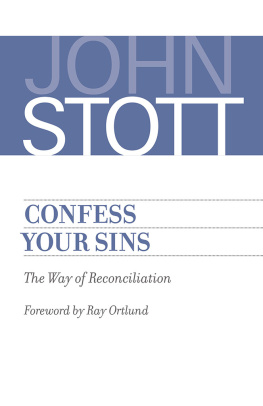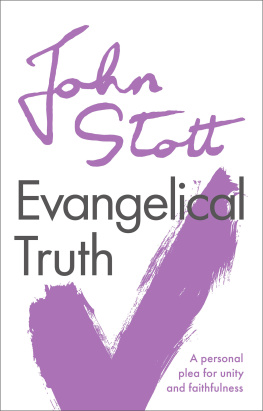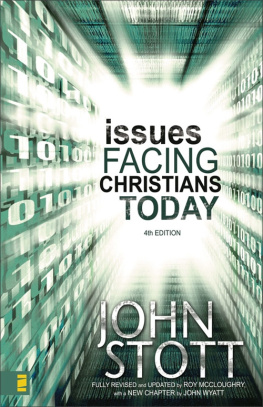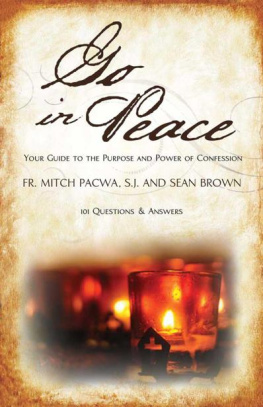JOHN STOTT
CONFESS YOUR SINS
The Way of Reconciliation
WILLIAM B. EERDMANS PUBLISHING COMPANY
GRAND RAPIDS, MICHIGAN
Wm. B. Eerdmans Publishing Co.
2140 Oak Industrial Drive NE, Grand Rapids, Michigan 49505
www.eerdmans.com
1964 John R. W. Stott
All rights reserved
Originally published in the U.K. by Hodder and Stoughton in the Christian
Foundation Series under the title Confess Your Sins 1964, (ASIN: B0000CM2WX).
U.S. edition originally published by Westminster Press, Philadelphia 1965.
This edition published 2017 by permission of
The Literary Executors of John R. W. Stott.
26 25 24 23 22 21 20 19 18 171 2 3 4 5 6 7 8 9 10
ISBN 978-0-8028-7509-9
eISBN 978-1-4674-4784-3
Library of Congress Cataloging-in-Publication Data
Names: Stott, John R. W., author.
Title: Confess your sins : the way of reconciliation / John Stott.
Description: Grand Rapids, Michigan : William B. Eerdmans Publishing Company, [2017] | Originally published: Philadelphia : Westminster Press, [1965, c1964]. | Includes bibliographical references and index.
Identifiers: LCCN 2017006475 | ISBN 9780802875099 (pbk. : alk. paper)
Subjects: LCSH: ConfessionAnglican Communion.
Classification: LCC BX5149.C6 S7 2017 | DDC 264/.030862dc23
LC record available at https://lccn.loc.gov/2017006475
All Scripture quotations, unless otherwise indicated, are taken from the Holy Bible, New International Version, NIV. Copyright 1973, 1978, 1984, 2011 by Biblica, Inc. Used by permission of Zondervan. All rights reserved worldwide.
www.zondervan.com
The NIV and New International Version are trademarks registered in the United States Patent and Trademark Office by Biblica, Inc.
Contents
T he title of this book, Confess Your Sins, will no doubt seem to some a clear indication of the unhealthy preoccupation of Christians with their sins. A year or two ago a lay correspondent wrote to The Times to complain of this very tendency. He found it disconcerting, whenever he attended a Church of England service, to be reminded of his sins. At Morning and Evening Prayer he was obliged to associate himself with the rest of the congregation as a crowd of miserable offenders. At every baptism he was informed that he was conceived and born in sin, at every wedding that marriage was a remedy against sin, and at every funeral that death delivered men out of the miseries of this sinful world. He had come to the conclusion that sin was with churchmen a veritable obsession.
There is no need for us to be offended by this criticism. We are not in the least ashamed of the fact that we think and talk a lot about sin. We do so for the simple reason that we are realists. Sin is an ugly fact. It is to be neither ignored nor ridiculed, but honestly faced. Indeed, Christianity is the only religion in the world which takes sin seriously and offers a satisfactory remedy for it. And the way to enjoy this remedy is not to deny the disease, but to confess it.
So far, so good. But to whom should we confess our sins? Some people say that it is necessary to confess them to a priest, and that this is in fact the way which God has appointed for us to be forgiven. Is this so? What is the character of Christian confession and the way of Christian forgiveness?
It may be useful to approach these questions by clearing the ground a bit, and by taking our stand on the common ground which is (or should be) shared by all Christians alike, whatever our particular persuasion. The truths on which we should be able to agree concern the fact and guilt of sin, the possibility of forgiveness, and the need for confession. Sin-confession-forgiveness are, in fact, an inseparable trio. Let me elaborate these truths in three straightforward Christian propositions.
Sin and Guilt
1. Our sins involve us in guilt, so that we need to be forgiven.
I cannot delay to establish the fact of human sin; I must assume that this is not in dispute between us. We have fallen short of our own ideals, let alone Gods standards. We have broken our own rules of conduct, let alone Gods holy laws. We are sinners.
But we must go further and add that we are guilty sinners. This is because sin, according to the Bible, is primarily an offense against God. Its gravity lies here. However much our misdeeds may bring disgrace to ourselves and sorrow and suffering to others, their greatest evil is that they constitute a rebellion against God, our Creator and our Lord. One of the Bibles simplest definitions of sin is that sin is lawlessness (1 Jn 3:4). The two words are convertible. Sin is an infringement of Gods known will, a revolt against his authority. It therefore makes us accountable to God (Rom 3:19), bringing us under his righteous displeasure and judgment. Only divine forgiveness can expunge our guilt and restore us to fellowship with God.
Forgiveness
2. Forgiveness is offered to us by God on the sole ground of the death of his Son.
All Christians believe that God is a forgiving God. It is part of our basic creed. I believe in... the forgiveness of sins. Christianity is fundamentally a religion of salvation, and salvation includes forgiveness. Thus one of the great promises of the New Covenant, foretold through Jeremiah, which Jesus said would be ratified by the shedding of his blood, was: I will forgive their wickedness, and will remember their sins no more (Jer 31:34; Mt 26:28). When the apostles began to preach the gospel, they were faithful to their Lords commission and proclaimed forgiveness of sins to those who repented and believed (Lk 24:47; Acts 2:38; 3:19; 13:3839). What they preached in their sermons, they also wrote in their epistlesfor example, as a recognizable echo of Matthew 26:28, that in Christ we have redemption through his blood, the forgiveness of sins, in accordance with the riches of Gods grace (Eph 1:7).
This last quotation not only makes it plain that redemption and forgiveness are to some extent equivalent terms and that they are a present, conscious possession which in Christ we have, but that they are both attributable to his blood, that is to say, his death on the cross. The Scripture teaches that when he died, he bore our sins (1 Pt 2:24), an Old Testament expression meaning that he suffered the consequences of our sins, and that only because he was made... to be sin for us can we become the righteousness of God, that is, be forgiven and accepted (2 Cor 5:21).
What the Bible asserts, the Prayer Book faithfully reflects. In the Holy Communion service we are told (in the first exhortation) that we obtain remission of our sins by His meritorious Cross and Passion... alone. In confessing our sins we therefore pray that God will have mercy upon us and for his Son our Lord
Confession
3. The confession of sin is a necessary condition of receiving the forgiveness of God.
The clearest statement of this third proposition is in one of the Scripture sentences which introduces Morning and Evening Prayer: If we claim to be without sin, we deceive ourselves and the truth is not in us. If we confess our sins, he is faithful and just and will forgive our sins and purify us from all unrighteousness (1 Jn 1:89). Here are two if sentences placed in contrast to one another, stating the result on the one hand of denying that we are sinners and on the other of confessing our sins. If we deny our sin, we deceive ourselves; if we confess our sins, we are forgiven. So the forgiveness of sins by God is made conditional upon the confession of sins by man. The Prayer Book exhortation goes on to enforce this truth, that we should acknowledge and confess our manifold sins and wickedness, and that we should not dissemble, nor cloke them, before the face of Almighty God our heavenly Father, but confess them...








